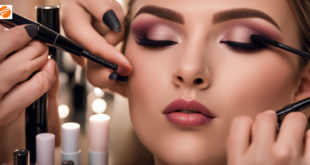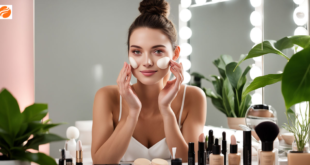
Healthy, glowing skin starts with the right skincare routine tailored to your skin’s needs. Dermatologists recommend using specific skincare products and practices to protect and nourish the skin, regardless of your skin type. Whether you’re dealing with dryness, acne, or sensitivity, these expert tips will guide you in building an effective skincare regimen that promotes long-term skin health. In this blog, we’ll dive into the best dermatologist-approved skincare practices, product recommendations, and essential steps to help you achieve radiant, clear skin.
Table of Contents
1. Cleansing: The Foundation of Healthy Skin
The first step in any dermatologist-recommended skincare routine is proper cleansing. Cleansing helps remove dirt, oil, and makeup that can clog pores and lead to breakouts or dullness. It’s essential to cleanse your skin twice a day—morning and night—to maintain a clear and healthy complexion.
How to Choose the Right Cleanser:
- For Oily Skin: Opt for a foaming or gel-based cleanser that helps control oil production without stripping the skin of its natural moisture.
- For Dry Skin: Use a hydrating, cream-based cleanser that cleanses without over-drying and helps lock in moisture.
- For Sensitive Skin: Choose a gentle, fragrance-free cleanser that’s formulated for sensitive skin to prevent irritation or redness.
Dermatologists recommend using lukewarm water when cleansing, as hot water can strip the skin of its natural oils, leading to dryness and irritation.
2. Moisturizing: Keep Your Skin Hydrated
No matter your skin type, moisturizing is crucial for maintaining your skin’s barrier and keeping it hydrated. The right moisturizer helps prevent dryness, reduces the appearance of fine lines, and protects your skin from environmental damage.
Moisturizer Tips for Different Skin Types:
- For Oily Skin: Use a lightweight, oil-free moisturizer that hydrates without clogging pores. Look for products labeled as non-comedogenic to avoid breakouts.
- For Dry Skin: Opt for a thicker, cream-based moisturizer that’s rich in hydrating ingredients like hyaluronic acid, glycerin, or ceramides to lock in moisture.
- For Combination Skin: Choose a balancing moisturizer that hydrates without making oily areas greasier, often a gel-based product is best for this skin type.
Dermatologists emphasize the importance of moisturizing twice daily, especially after cleansing to replenish the skin’s natural moisture.
3. Sunscreen: The Most Important Step in Skincare
Daily sun protection is non-negotiable in any dermatologist-recommended skincare routine. Exposure to ultraviolet (UV) rays can cause premature aging, dark spots, and increase the risk of skin cancer. Sunscreen should be applied every morning, even on cloudy days or when you’re indoors.
How to Choose and Apply Sunscreen:
- Broad-Spectrum Protection: Look for a broad-spectrum sunscreen that protects against both UVA and UVB rays.
- SPF 30 or Higher: Dermatologists recommend using an SPF of at least 30 for adequate daily protection.
- Reapplication: Reapply sunscreen every two hours if you’re outdoors, especially if you’re sweating or swimming.
For people with sensitive or acne-prone skin, mineral sunscreens containing zinc oxide or titanium dioxide are gentler on the skin and less likely to cause breakouts.
4. Exfoliation: Clear Dead Skin Cells for Radiant Skin
Exfoliation is key to removing dead skin cells that can clog pores and make your skin appear dull. However, over-exfoliation can irritate the skin, so dermatologists recommend exfoliating no more than 2-3 times per week, depending on your skin type.
Best Exfoliation Practices:
- For Sensitive Skin: Opt for a mild exfoliant, like a lactic acid-based product, that gently dissolves dead skin cells without causing irritation.
- For Oily or Acne-Prone Skin: Salicylic acid-based exfoliants help unclog pores and reduce breakouts.
- For Normal to Combination Skin: Glycolic acid or physical exfoliants (like scrubs) can help smooth texture and brighten the skin, but use them sparingly to avoid over-exfoliating.
Regular exfoliation encourages cell turnover, revealing smoother, more radiant skin and allowing other skincare products to penetrate more effectively.
5. Targeted Treatments: Serums and Spot Treatments
Serums are packed with active ingredients that target specific skin concerns such as dark spots, wrinkles, or acne. Adding a serum to your routine allows you to address these issues with concentrated formulas designed to deliver visible results.
Popular Dermatologist-Recommended Serums:
- For Brightening: Vitamin C serums are excellent for reducing hyperpigmentation, evening out skin tone, and boosting collagen production.
- For Anti-Aging: Retinol or peptides are commonly recommended to minimize fine lines and improve skin texture.
- For Hydration: Hyaluronic acid serums draw moisture into the skin, helping it stay plump and hydrated throughout the day.
- For Acne: Look for serums containing salicylic acid, niacinamide, or benzoyl peroxide to combat breakouts and reduce inflammation.
Spot treatments are also important for addressing acne or blemishes directly. Products with benzoyl peroxide or sulfur can reduce redness and clear up pimples faster.
6. Nighttime Routine: Repair and Rejuvenate
Your nighttime skincare routine is essential for repairing the skin after a long day. During sleep, your skin goes through a process of regeneration, making it the ideal time to use targeted treatments and heavier moisturizers.
Nighttime Skincare Tips:
- Double Cleansing: If you wear makeup or sunscreen during the day, use an oil-based cleanser first, followed by your regular facial cleanser to ensure all impurities are removed.
- Retinol for Anti-Aging: Dermatologists recommend incorporating retinol into your nighttime routine for its powerful anti-aging benefits, as it helps boost cell turnover and smooth fine lines.
- Hydration Boost: Use a thicker moisturizer or overnight mask to lock in moisture while you sleep. Look for products with hydrating ingredients like ceramides, squalane, and hyaluronic acid.
7. Eye Cream: Treat the Delicate Eye Area
The skin around the eyes is thinner and more delicate than the rest of the face, making it prone to fine lines, puffiness, and dark circles. Dermatologists recommend using a specialized eye cream to address these concerns and keep the eye area hydrated.
Choosing the Right Eye Cream:
- For Puffiness: Look for eye creams with caffeine to reduce swelling and give your eyes a refreshed appearance.
- For Dark Circles: Vitamin C or peptides can help brighten the under-eye area and reduce the appearance of dark circles.
- For Fine Lines: Retinol-based eye creams help smooth out fine lines, while hyaluronic acid adds hydration to plump the skin.
8. Diet and Lifestyle for Healthy Skin
While a consistent skincare routine is essential, your diet and lifestyle also play a significant role in the appearance and health of your skin. Dermatologists emphasize that proper hydration, a balanced diet, and healthy lifestyle habits contribute to glowing skin.
Tips for Healthy Skin from Within:
- Stay Hydrated: Drinking plenty of water helps maintain the skin’s moisture levels and supports its natural barrier function.
- Eat a Balanced Diet: Incorporate antioxidant-rich foods like berries, leafy greens, and fatty fish into your diet to nourish your skin from the inside out.
- Manage Stress: Chronic stress can lead to breakouts and other skin issues, so finding ways to manage stress through exercise, meditation, or hobbies can improve your skin’s overall appearance.
also read How to Boost Your Immune System Naturally
Conclusion: Building Your Dermatologist-Recommended Skincare Routine
A dermatologist-recommended skincare routine is designed to protect, nourish, and enhance your skin’s natural beauty. By following these expert tips—cleansing, moisturizing, using sunscreen, exfoliating, and incorporating targeted treatments—you’ll be well on your way to achieving radiant, healthy skin. Remember, consistency is key when it comes to skincare, and using the right products for your skin type is essential for long-term results.
click here for more info
FAQs
1. How often should I exfoliate my skin?
Dermatologists recommend exfoliating 2-3 times a week, depending on your skin type, to avoid irritation or over-exfoliation.
2. Do I really need to use sunscreen every day?
Yes, wearing sunscreen daily is crucial to protect your skin from harmful UV rays, even on cloudy days or when you’re indoors.
3. What are the best ingredients for anti-aging?
Retinol, peptides, and antioxidants like Vitamin C are some of the most effective ingredients for reducing signs of aging, according to dermatologists.
 Health live a Healthy life
Health live a Healthy life





